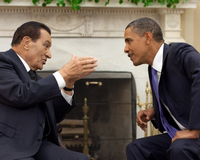The Obama administration's reaction to the dramatic events in Egypt has inspired many analogies in recent days. Its initial caution and clumsiness, followed by its conviction to "be on the right side of history," reminded optimists of the Bush administration's reaction in 1989 to the uprisings in Eastern Europe, for example, and pessimists of the Carter administration's reaction a decade earlier to Iran's revolution.
The Obama administration's air of ambivalence, however, evokes a perennial condition of international relations. Accustomed as most of us are to power hierarchies, we often overlook how difficult and complex actual relations can be between big and small countries, especially when those relations fall into the category of patron and client.
In this respect, the difficulties the U.S. confronts as its Egyptian ally shows signs of collapsing are similar to those China has faced in recent years with regard to North Korea, those between Iran and its various auxiliaries in Lebanon and elsewhere in the region, and, for that matter, between the United States and other important allies, like Israel: For every bit of leverage a patron seeks to wield, the client comes to realize its own relative power. Rarely does the big power command and the smaller obey. In other words, no member of the latter group above is a proxy, strictly speaking.

